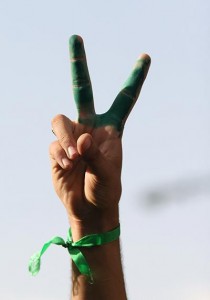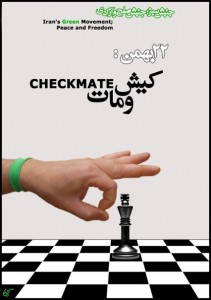The Latest from Iran (13 February): Re-assessment, Renewal
 Saturday, February 13, 2010 at 21:22
Saturday, February 13, 2010 at 21:22  2125 GMT: Reports have emerged that two more journalists, Mohammad Ghaznavian and Hamid Mafi, have been detained. They join more than 60 others in Iran's prisons.
2125 GMT: Reports have emerged that two more journalists, Mohammad Ghaznavian and Hamid Mafi, have been detained. They join more than 60 others in Iran's prisons.2120 GMT: We have posted a snap analysis of what appears to be a serious challenge by Khabar Online, the website linked to Ali Larijani, to President Ahmadinejad. If we are on the mark, then in light of this week's suppression of Ayande News, it will be intriguing to see the Government's response to another location of "conservative" criticism.
2025 GMT: We have posted the text of Mehdi Karroubi's first interview after 22 Bahman.
1955 GMT: Secretary of State Hillary Clinton has written the academic colleagues of imprisoned Iranian-American scholar Kian Tajbakhsh, "The espionage charges leveled against Dr. Tajbakhsh are groundless. The State Department is using every available diplomatic tool to achieve Dr. Tajbakhsh's release."
Tajbakhsh was jailed for 15 years in October on charges of espionage. Clinton said in her letter that Kian Tajbakhsh has not been allowed to meet with Swiss diplomats, who serve as the United States' diplomatic representatives in Iran, because Iran considers Tajbakhsh an Iranian citizen.
NEW Iran: Reading Khabar’s “Conservative” Attack on Ahmadinejad
NEW Iran: Mehdi Karroubi’s 1st Interview After 22 Bahman (13 February)
NEW Iran: Desperately Seeking Sensible US Comment about 22 Bahman
NEW Iran: “Allahu Akhbar from the Rooftops” — The 2009 Photo of the Year
Iran Video Special (2): Decoding the 22 Bahman Rally in Azadi Square
Iran Video Special (1): The 22 Bahman Attack on Karroubi?
Iran: 22 Bahman’s Reality “No Victory, No Defeat”
Iran Analysis: The Regime’s Pyrrhic Victory
Iran: The Events of 22 Bahman, Seen from Inside Tehran
Iran on 22 Bahman: Ahmadinejad “Wins Ugly” (This Time)
Iran: Greening YouTube — An Interview with Mehdi Saharkhiz
The Latest from Iran (12 February): The Day After 22 Bahman
1940 GMT: A Friday Prayer for All. Neday-e Sabz Azadi reports, via Radio Zamaneh, that the Friday Prayers leader of Zahedan, Molavi Abdolhamid, described the Islamic Republic as a system that gives equal freedom to both pro- and anti-Government groups and allows voices of opposition to be heard: “The people of Iran brought the Revolution to victory to achieve its goals and now they demand the reviewing and realization of those goals.”
1817 GMT: Re-Assessment (cont.). The Los Angeles Times has a wide-ranging, sometimes sprawling review of 22 Bahman. At its heart, however, is an interview with a female journalist in Tehran pondering the next steps for the Green Movement:
Our response was better than getting angry and violent and paying a lot of costs and not gaining anything. I think it was a wise choice to just show the government that we disagree, and not to pay too much of a cost, and not hurry to overthrow the system, and to just consider [the day] as a step in the path that we are on and will continue.
If the government believes that the green movement is finished, they are mistaken. Actually, I don't think that they are that stupid.
1810 GMT: Student activist Vahid Abedini has been released from detention.
1615 GMT: Re-assessing. Setareh Sabety's assessment of the way forward after 22 Bahman, which we featured on Thursday, has now been extended for The Huffington Post.
1610 GMT: More on the Karroubi Attack (see 1452 GMT). The account in Saham News claims that Ali Karroubi, son of Mehdi Karroubi, was taken to Amirolmomenin mosque after his arrest, beaten severely, and threatened with rape.
1600 GMT: Like Rah-e-Sabz, the Green website Tahavol-e-Sabz is on-line on a different address after it was taken down by a cyber-attack on Friday. And Mir Hossein Mousavi's Kalemeh is also now back in operation.
1452 GMT: The 22 Bahman Attack. Fatemeh Karroubi, the wife of Mehdi Karroubi, has written to the Supreme Leader to complain about the physical abuse of her son Ali when he was arrested on 22 Bahman during an assault on the Karroubi entourage. A picture in Karroubi's Saham News shows a bruised Ali Karroubi.
1432 GMT: On the Labour Front. The Flying Carpet Institute passes on an English translation of a Radio Farda interview with the leader of a recently-formed labor organisation at the Isfahan Steel Factory.
1430 GMT: We've posted a separate entry considering US "expert" reaction to the events of 22 Bahman.
1300 GMT: The reformist Islamic Iran Participation Front has issued a statement about the events of 22 Bahman.
1145 GMT: And More Clarification. An EA correspondent checks in:
Rah-e-Sabz reports that, contrary to popular perception, Ayande News is run by an ally of Mohsen Rezaei (Secretary of the Expediency Council and Presidential candidate) and not of Hashemi Rafsanjani. The entire editorial team was indeed arrested on 11 February, and the current notice regarding the arrest of the editor-in-chief, Fouad Sadeghi, was placed there because of pressure by the intelligence forces. Rah-e-Sabz speculates that Sadeghi is resolutely opposed to the transfer of Iranian uranium abroad, which is why the Government might have arrested him.
1125 GMT: Important Correction. Ayande News is not operating "as normal" after the reported detention of all of its staff, including editor-in-chief Fouad Sadeghi, just before 22 Bahman (see 0920 GMT). The site has not been updated since Wednesday, when it noted the detentions and suspension of operations.
1025 GMT: Sure, Sure, Whatever. Political posturing all around this morning. Iranian state media bangs out the "self-sufficient" beat: "Iran's nuclear point man Ali Akhbar Salehi says that much to the West's surprise, Tehran will produce nuclear fuel plates within the next few months."
And American not-really-state-media (The New York Times) serves as Obama Administration "get tough" spokesperson:
With tensions over Iran’s nuclear ambitions hitting new levels, the United States is mounting a diplomatic full-court press in the Middle East, sending four top diplomats, including Secretary of State Hillary Rodham Clinton, to confer with Arab and Israeli leaders.
The envoys’ visits to Israel, Lebanon, Syria, Jordan, Egypt, Saudi Arabia and Qatar were planned separately in recent weeks, but they now have a common purpose, administration officials said: to reassure Iran’s neighbors that the United States will stand firm against Tehran, and to enlist other countries in a global effort to put pressure on the Iranian authorities.
0925 GMT: Toeing the Line. Former Presidential candidate Ali Akbar Nategh Nouri has declared, "Even one foe in the Government is too much."
0920 GMT: Claim of Day. If this is true, it is a huge story. Iran Green Voice is asserting, from sources, that all staff of Ayande News were detained on the night of 22 Bahman. Ayande is not "reformist" but affiliated with Hashemi Rafsanjani.
Ayande is on-line as normal this morning. (see 1125 GMT)
0915 GMT: Free Them. A group of international organizations, journalists, writers, and publishers have written an open letter to the Supreme Leader demanding freedom for at least 60 imprisoned journalists and writers in Iran.
0910 GMT: More Numbers. Ebrahim Nabavi writes, "According to eye-witnesses, the government insists on the fact that four million loudspeakers participated in 22 Bahman."
0845 GMT: The Numbers on 22 Bahman. The Newest Deal, using Google's eye-in-the-sky imagery of Azadi Square on Thursday, offers a concise, effective repudiation to the official claims of "millions" supporting the regime on the day.
0755 GMT: On the International Front. Arms for Iran, sent by a Russian export company,have reportedly been confiscated at Frankfurt Airport in Germany.
Following the European Parliament resolution challenging Iran over internal abuses and its nuclear programme, German Foreign Minister Guido Westerwelle has sharply condemned human rights violations in Iran and demanded harsher sanctions.
And speculation continues as to why Saeed Jalili, Iran's Secretary of the National Security Council and key figure in nuclear talks, had trip to Moscow cancelled last week.
0740 GMT: We began yesterday by looking for reactions to Thursday's demonstrations, especially political re-alignments within the Iranian regime and political re-assessments within the opposition and Green movements.
We got both.
On the "conservative" side, the fightback against President Ahmadinejad's declared victory came late, but it was clear and strong in the statement of the member of Parliament and Larijani ally Ali Motahhari. His interview, published in the Larijani-allied Khabar Online, was a forthright challenge for "both sides" to acknowledge mistakes. That has been standard rhetoric for Motahhari for weeks; what was distinctive was his specific challenge to the Government to stop banning the press and to release all political prisoners.
Yet it was the re-assessment on the opposition side that was most striking on Friday. The let-down of Thursday slowly gave way to a more balanced reaction. That was supported in part by the emerging evidence --- which we had projected in our analyses late on Thursday and early on Friday --- that the support for the regime on 22 Bahman was not as large as first believed and certainly was not as enthusiastic.
Beyond that, however, was an even more important conclusion: hopes for 22 Bahman had been inflated and the opposition approach to the day had been very, very wrong, but this was a tactical failure, not the demise of the Green movement. Tehran Bureau, which had been striking in its pessimism late Thursday, now features an analysis by Muhammad Sahimi which swings back to long-term determination: "There is a new dawn in the struggle of the Iranian people for democracy and the rule of law. The Green Movement must develop the necessary organization and adjust its tactics dynamically in order to make further progress during this turbulent era."
More importantly than any statement from an organisation on "the outside", activists inside Iran have made that assessment. So to the next phase of this crisis.
 Ali Akbar Nategh-Nouri,
Ali Akbar Nategh-Nouri,  Ali Akhbar Salehi,
Ali Akhbar Salehi,  Ali Karroubi,
Ali Karroubi,  Ali Larijani,
Ali Larijani,  Ali Motahhari,
Ali Motahhari,  Ayande News,
Ayande News,  Ayatollah Ali Khamenei,
Ayatollah Ali Khamenei,  Ebrahim Nabavi,
Ebrahim Nabavi,  Expediency Council,
Expediency Council,  Fatemeh Karroubi,
Fatemeh Karroubi,  Fouad Sadeghi,
Fouad Sadeghi,  Germany,
Germany,  Google,
Google,  Green Movement,
Green Movement,  Hamid Mafi,
Hamid Mafi,  Hillary Clinton,
Hillary Clinton,  Huffington Post,
Huffington Post,  Iran,
Iran,  Iran Elections 2009,
Iran Elections 2009,  Iran Green Voice,
Iran Green Voice,  Isfahan Steel Factory,
Isfahan Steel Factory,  Khabar Online,
Khabar Online,  Kian Tajbakhsh,
Kian Tajbakhsh,  Los Angeles Times,
Los Angeles Times,  Mahmoud Ahmadinejad,
Mahmoud Ahmadinejad,  Mehdi Karroubi,
Mehdi Karroubi,  Mohammad Ghaznavian,
Mohammad Ghaznavian,  Mohsen Rezaei,
Mohsen Rezaei,  Molavi Abdolhamid,
Molavi Abdolhamid,  Muhammad Sahimi,
Muhammad Sahimi,  Neday-e Sabz Azadi,
Neday-e Sabz Azadi,  New York Times,
New York Times,  Radio Farda,
Radio Farda,  Radio Zamaneh,
Radio Zamaneh,  Russia,
Russia,  Saeed Jalili,
Saeed Jalili,  Saham News,
Saham News,  Setareh Sabety,
Setareh Sabety,  Tahavol-e-Sabz,
Tahavol-e-Sabz,  Tehran Bureau,
Tehran Bureau,  The Flying Carpet Institute,
The Flying Carpet Institute,  The Newest Deal,
The Newest Deal,  Vahid Abedini in
Vahid Abedini in  Middle East & Iran
Middle East & Iran 




